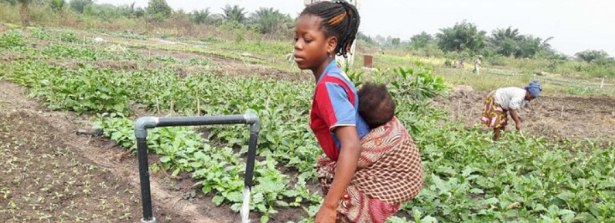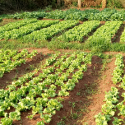Improving urban food security : A success story

This Story of change has been drafted in the context of the Global Challenges Programme (GCP) project “Allotment gardens and food security in urban Africa” and outlines how support to urban poor, especially women in developing allotment gardens can provide their households with access to fresh foods. This success story about improving urban food security in Benin was written by members of the project research team, D. Houessou, S. Dossou, A. Aoudji , F. Thoto and B. Sonneveld.
What was the context?
An allotment garden is a form of urban agriculture where a plot of land is allocated to a group of individuals and families to produce food plants. The project developed two allotment gardens in two big cities of Benin – Cotonou and Porto-Novo – to achieve its objective. The area
of the gardens was one hectare and divided each by 20 small plots of 400 square meters which, were allocated to participants.
Key messages
- An appropriate support in developing allotment gardens can provide urban poor, especially women with access to fruits and vegetables.
- The promotion of allotment gardens upscaling in cities can improve the food security in urban areas.
What assumption was challenged?
The project tested if allotment gardens in urban and peri-urban areas can provide urban poor with access to fruits, vegetables and income, a safe place for women to gain some extra income and information on the optimal organizational and financial structure that sustains long term development of allotment gardens. Therefore, the project randomly selected participants who met some criteria which, actually
make them vulnerable in urban areas and constrain their development. The criteria encompassed: age (20-35), unemployed, single or married with children, low purchase power, poor diet patterns, schooled at most primary, no access to formal health system, credit and land. Hence, it was assumed that, by training and supporting these participants in the garden development, their households would easily
have foods to cook and their food security situation would be improved.
What was the specific contribution of the research?
Prior to the selection of participants, preparation operations such as weeding, delimitation, drilling construction, water piping were performed on the two pilot areas of the project. Training of selected participants in garden development was organized per pilot to teach participants the production methods and how to manage the gardens like a cooperative. The training sessions lasted one week per site and covered their objectives of production (what to grow, how to grow it, etc.), their plan (what skills and financial assistance needed, suitability of weather conditions for animals/produce, etc.), their products (cultivation of one or multiple products, own consumption or sale), and people (possible clients, need of guidance, etc.). The project also ensured that a discontinuity support was provided to participants for additional support such as facing pest management for example. Some useful materials were given to participants in order to facilitate the work.
What was the change?
Few weeks after the training, the majority of the plots of participants in the pilots was covered with vegetables. There were both exotic and indigenous vegetables: Amaranthus spp, Cucumus sativus, Lactuca sativa, Solanum macrocarpon, Dacus carota, Ocimum gratissimum, Capsicum annuum, Corchorus olitorius L., Cymbopogon citratus. Participants also started harvesting crops per small piece in the gardens and the products were eather self-consumed or sold. For instance, a woman shared her story about how easily she had foods to cook at home. These observations confirmed our assumption and showed that an appropriate training and support to urban poor in garden development can provide their households with access to fresh foods, showing little steps towards their increased food security situation.
Now what?
This intended and positive change in the implementation of the project approach in pilot sites showed that an appropriate support to urban poor, especially women in developing allotment gardens can provide their households with access to fruits and vegetables. Furthermore, it revealed that the promotion of allotment gardens upscaling in cities can increase the food security in urban areas.
_ _ _
This story of change is a knowledge product developed with the financial support of the Netherlands Organisation for Scientific Research (NWO-WOTRO) through its Food & Business Global Challenges Programme.
Download the Story of change as PDF.






